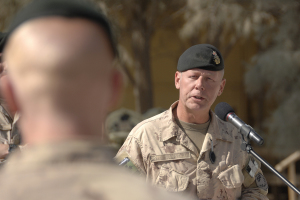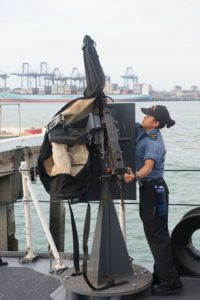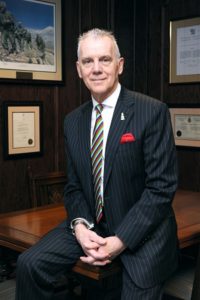The CDS had been in his position for 10 months when he agreed to an interview. Over the hour LGen Michel Maisonneuve (retd) spent with the general, the two main themes the CDS spoke on were: support to the troops and relations with the government.
In this first installment, Gen. Vance talks about the importance of adjusting personnel policies to today’s world.
MM: Everybody arrives in a new job with a vision of what he or she wants to accomplish. What is your vision for the future of the institution and has it changed over the last months?
JV: Honestly, no. I saw my role and any good that I can do fall in two or three categories. One is operations, with which I was quite comfortable and remain so. There is something that I’d like to do better in this regard, and that is trying to get us to more thoroughly understand the environment before we launch operations. Then we should try to determine what it is that we are going to deliver as a military force in a world where military force by itself is becoming less and less decisive. So I am committed to making certain, as we develop options for government, that those options have tangible deliverables – that we don’t over-promise.
Secondly, as the steward of the profession of arms, we are making certain that we envision how the Armed Forces develop into the future; what kind of environment we are going to be operating in and making sure that we gear all of the policy decision-making around that. This includes how we will nurture the force and build the force, keeping in mind all the really important stuff such as service before self, that binds us together in the profession of arms.

We have to become much better at determining first what we can achieve and then delivering results. We are now on highly tailored missions to deliver specific results.
Mission command will still prevail, but you are going to be accountable to deliver absolutely assertive effects. To be able to do that we need an architecture that informs the commander and directs the commander to achieve the things that are achievable. It’s operational art, but it’s kind of on steroids, really focused. Those two are related (operations and the profession of arms), but now how do I affect the profession of arms to cover operations. So that accounts for maybe 20% of my time on each, and the other 60% of my vision is on the institution itself, as a place to work, have a career; the people side, which includes the equipment side too. When I say take care of the institution, I need to look at all of it. I know now, how our people need an element of individualization and customization in their military career that allows them to continue to serve in a satisfying way.
MM: Are you talking about accommodating people?
JV: It’s more than accommodating; it’s encouraging it. We need to learn from the fact that if we want to draw from the best across the country, we are going to have employer-of-choice kind of ideas. We are not going to be that today unless there is an element of individualization that doesn’t cross the line between service before self, but allows people that may have a slightly different path in mind to still be able to serve.
MM: Op Honour is an initiative that you felt you had to grip right from the start. How do you feel this is going?
JV: Frankly, it’s going the way that I had envisioned. I started off making my intent clear, we’re now going from intent into the specifics of understanding better where we are really at through the Statscan survey. So we are looking forward to the results of that and at the same time, putting in place and updating the policies, getting the definitions right, putting in place the structures that can help people, making it a victim-centered approach, all that stuff. So it never goes fast enough or well enough for me, but I think that we are all in that mindset and I know the senior leadership is all in that mindset. I see this is as straight leadership/take care of our people issue: having a workplace environment that encourages a – no kidding – satisfied, happy life in the military.
MM: Are you still finding that there are a lot of folks that just don’t get it, that are still in the Forces? I ask you that because I still hear of incidents happening, that you just have to shake your head and say, “What is it you don’t understand in the way that we should be dealing with folks today?”
JV: It still goes on. However, everywhere I go people have heard of Op Honor, they understand Op Honor, and I think the chain of command and leadership did a good job in getting it out there. The problem is, it’s not a one-time thing. It’s got to be a persistent effort and so I’m pushing and won’t let up. I issued that order to the Armed Forces on 17 July [2015], and I of course realized that not everybody will instantly follow the course. I knew that what that did was to seize people’s attention for the vast majority, but yes there are still some people that just don’t get it. But I’ve got to tell you we’re following up and I’m watching this really closely. Not only has it got to be done because it’s the right thing to do, but we have other cultural issues to move along and therefore if we can’t deal with this which is pretty black and white, we’ll have trouble with the rest.

MM: What about this culture of conformity that you spoke about?
JV: There is a whole other part of our culture in this institutional evolution that we’ve got to go through where each individual counts. Individuals that have a problem or stick their hand up and say I’m a little bit different, at this point, are not the enemy. They are not criminals and I want people to start to manage and make decisions that benefit the individual provided that they will not cross any [policy] lines. Decisions that benefit the individual so they can continue to serve, so they can continue to do the best they can.
That’s difficult space, particularly because we all came from a world where policies were very clear: you’re in or you’re out.
And the one thing that makes me confident that we are going the right way, is that the best war fighters, the best operations are performed by people with creativity, problem-solving skills, those that can look at challenges not just through the lens of the old school combat estimate but that can think widely, analyze and get things done.
And that do so in an environment that encourages a bit of individualism, a bit of creativity, that allows the best people to feel confident. That’s how we are going to win, in the future… so we need to change the policy base to encourage people to be conformist where they have to be, always following the law of the land but recognizing that there is going to be an element of care, the duty of care, that has an individual quality to it.
MM: Which fits within the 60 % looking after the institution, including obviously Op Honor.
JV: Op Honor, diversity, and for example my express support to Royal Military College Saint-Jean becoming a degree-granting institution to make sure that we continue to draw future officers from Quebec and Francophones across Canada.
MM: Certainly on that aspect, the programs in the Humanities that we will be putting in place in Saint-Jean in anthropology, sociology, philosophy, ethics and foreign languages and cultures, these are programs that will be very useful for Canadian Forces officers.
JV: I was thinking after we spoke that we’ve never had the Presidio kind of idea that the U.S. has: the place to educate foreign service specialists, those going to be an Attaché in a specific region.

MM: Right, where you can get a certificate in a specific discipline. The university level at RMC Saint-Jean will also help us eventually provide accreditation for our Non-Commissioned Officers who go through all their programs at the Osside Institute so they see the benefits of education for professional military personnel dealing with new conflict environments.
JV: This is a good example of how we have to be a learning institution. So we are not broken at all, we are better than most institutions in the free world but I don’t want us to rest on our laurels.
MM: Turning now to mental illness in the Canadian Armed Forces. You heard about the tragic events at RMC of Canada. In your view does that all fits into looking after our people and making sure they have the place to serve that they should have?
JV: We don’t have all the answers. We do know that we need to look very closely at it. Suicide prevention, getting people the care they need, that’s going to help. Ill, injured and sick, we have to make certain that was notwithstanding universality of service, we stop people from thinking that declaring an illness or a hurt is going to automatically have a negative career effect, particularly on promotion. So, in some cases people hide or keep an injury or an illness quiet until they are promoted – because you can’t be promoted if there is a question – but once promoted, they’re fine and meeting universality of service; that’s crazy.
As long as you get better and continue to serve, why would we put you through that, to deny you the medical care? So we’ve got to look at that writ large: we are going to make sure that people understand that we care about their health. They need to care about their health and to uncouple their recovery from illness or injury from promotion and their move up the chain. We are looking to modernize that, exactly the kind of policies we need to review.

MM: And what about those folks who come back from operations ill or injured. Do you see them having more of a place? I’ve heard what you said about the universality of service and that cannot go away. Is there a way we can find room for some of the folks that want to continue to serve in uniform in some sort of capacity? Do you have the power as CDS to say I want to keep that guy and if you did so, would that opens the flood gates to a whole pile of others?
JV: We are going to stick to the universality of service. You have to be able to deploy. You have to make those thresholds. One of the reasons I’m looking at the JPSU structure is that if you think that serving healthy people need an element of customization in their life, those people who are in transition and need support must also have a custom-fit transition plan.
In my opinion, you have one of two missions if you are in that category of complex of injury: the first one, to recover and go back to duty. So you need to be doing all that stuff that you need to build your recovery plan: that’s your job, every day, getting back to full duty.
The other mission may be successful transition out of uniform. Some people will take weeks to do that and some will take years. And it doesn’t matter to me how long it takes. I want to make certain that I have the flexibility in policy that will keep you until you can successfully transit on a customized plan.
Until you are safe, have the education that you need, the rehab that you need, and so on. And that is part of the seamless transition work that Walt [Natynczyk – Deputy Minister of Veterans Affairs] and John [Forster – Deputy Minister of National Defence] and the two Minister are doing.
MM: You were at the Invictus Games recently, so you saw a lot of our best.
JV: Yes, there are tremendous people out there who, through no fault of their own, where something happens in their military career, there is an element of limitation, and they don’t deserve that. I think they can stay connected to the Armed Forces in many ways but to be serving in uniform, you have to be able to meet the conditions of universality of service – you just have to.
That being said, we can, I think, build into our force structure policies to take care of people as long as we need to allow them to make their transition.
My sense is that if you keep people in who would otherwise have a brilliant career, the limitations will start to hurt overtime; and I don’t think that’s fair either.
Now, I think there is ample room first to look at where high quality people can join the public service and continue to contribute. And if you look at intelligence and the social media world and all that, there are going to be a lot of ways to contribute to the success of the Armed Forces but you won’t necessarily need to be in uniform.
MM: Thanks, Chief.
In the next part of the interview, the CDS talks about his role with the Government, the Defence Policy Review, operations and procurement.

Lieutenant-General (Retd) J.O. Michel Maisonneuve, CMM, MSC, CD, is Academic Director of Royal Military College Saint-Jean. He completed 35 years of service in the Canadian Armed Forces in 2007 culminating in the position of Chief of Staff of NATO’s Supreme Allied Command Transformation in Norfolk, USA. He also held the position of Assistant Deputy Chief of the Defence Staff in Ottawa. An Armour officer from 12e Régiment blindé du Canada, Lt. Gen.(Retd) Maisonneuve distinguished himself in progressive leadership and staff positions in Canada and abroad at every level.
(Click on the image below to open up the latest issue of the Vanguard)


